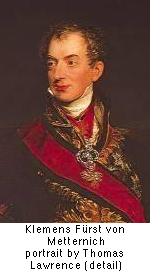Klemens Fürst (Prince) von Metternich
Austrian minister of foreign affairs, b. 15 May 1773 (Koblenz, Germany), d. 11 June 1859 (Vienna, Austria)
 Metternich was a member of the old German aristocracy and shared the conservative ideas of his class. In 1788 he enrolled at the University of Strasbourg, France, to study diplomacy. To avoid the approaching French Revolution he moved to the University of Mainz (Germany) in 1790 and then on to Brussels to join his father. In 1794, after a brief stay in England, he followed his father, who had fled to Vienna.
Metternich was a member of the old German aristocracy and shared the conservative ideas of his class. In 1788 he enrolled at the University of Strasbourg, France, to study diplomacy. To avoid the approaching French Revolution he moved to the University of Mainz (Germany) in 1790 and then on to Brussels to join his father. In 1794, after a brief stay in England, he followed his father, who had fled to Vienna.
The young Metternich gained access to the Austrian ruling class and to the ardently desired high office through marriage with countess Eleonore Kaunitz. His marriage did not deter him from following amourous liaisons at Europe's courts for private as well as political reasons.
Metternich's Austrian career began with the appointment to the court of Dresden (Saxony) in 1801, followed by appointment to Berlin (Prussia) in 1803 and Paris (France) in 1806. In 1809 Metternich became minister of foreign affairs.
Metternich's first and foremost aim was to forestall the revolutionary nationalist movements that demanded democratic parliaments in united nation states. He tried to achieve this by two means,
- through the revival and extension of the institutions of the old principalities as an alternative to national parliaments, and
- through the establishment of a lasting European "balance of power" on the basis of regional groupings: France, England, Russia and a German and an Italian confederation, both to be lead by Austria.
In both intentions he was only partly successful. His suggestion to reorganize the Austrian state into a federation, for example, was rebuffed by the absolutist emperor Joseph II. His plan to create an Italian confederation lead the emperor to enforce the unification of Lombardy with Venice, creating long-lasting animosity towards Austria.
To achieve his aims Metternich exploited all means of diplomacy. He managed to have archduchess Marie-Louise, the daughter of emperor Francis I (the predesessor of Joseph II), married to Napoleon I, which gave him urgently needed respite from Napoleon's expansionist plans. When Napoleon invaded Russia he sent an Austrian contingent along. When the war turned into disaster he retreated into indifferent neutrality, which allowed him to fill the exhausted Austrian state finances and rearm.
By the time Napoleon's troups (or what was left of them) had returned from the disastrous Russian campaign Metternich had established Austria as such an important European power that it became the venue for the drafting of the plans for a future Europe. The Congress of Vienna of September 1814 - June 1815 was the highest point of Metternich's career. It was a dazzling social event of never-ending festivities. Politically it could only produce a compromise, given the number of competing states.
Despite its limitations the Congress established a long-lasting order in Europe, and this was Metternich's creation. Metternich's vision was a series of Europena congresses, where the European powers would negotiate their interests and act together to intervene against revolutionary movements. The next seven years witnessed indeed four such congresses, which confirmed Metternich's position as the most successful diplomat of the time.
As the years passed, however, Metternich could not stem the rising tide of national revolution. The first to break ranks was England, which, for obvious reasons of self-interest, declared its support for the right to self-determination for the South American colonies against Spanish rule.
Metternich had always had an air of vanity. This trait became more prominent as he became increasingly isolated and was bypassed also in internal Austrian affairs. In conversation he became rambling, diffuse and often ridiculous. To prove his importance he was prepared to sign documents that he neither originated nor agreed with. Eventually the public saw him as the personification of repression and absolutism.
When the revolution of 1848 broke out in Germany and Austria Metternich was forced to resign. He went into exile in England but returned in 1851 and died in Vienna eight years later.
home
 Metternich was a member of the old German aristocracy and shared the conservative ideas of his class. In 1788 he enrolled at the University of Strasbourg, France, to study diplomacy. To avoid the approaching French Revolution he moved to the University of Mainz (Germany) in 1790 and then on to Brussels to join his father. In 1794, after a brief stay in England, he followed his father, who had fled to Vienna.
Metternich was a member of the old German aristocracy and shared the conservative ideas of his class. In 1788 he enrolled at the University of Strasbourg, France, to study diplomacy. To avoid the approaching French Revolution he moved to the University of Mainz (Germany) in 1790 and then on to Brussels to join his father. In 1794, after a brief stay in England, he followed his father, who had fled to Vienna.